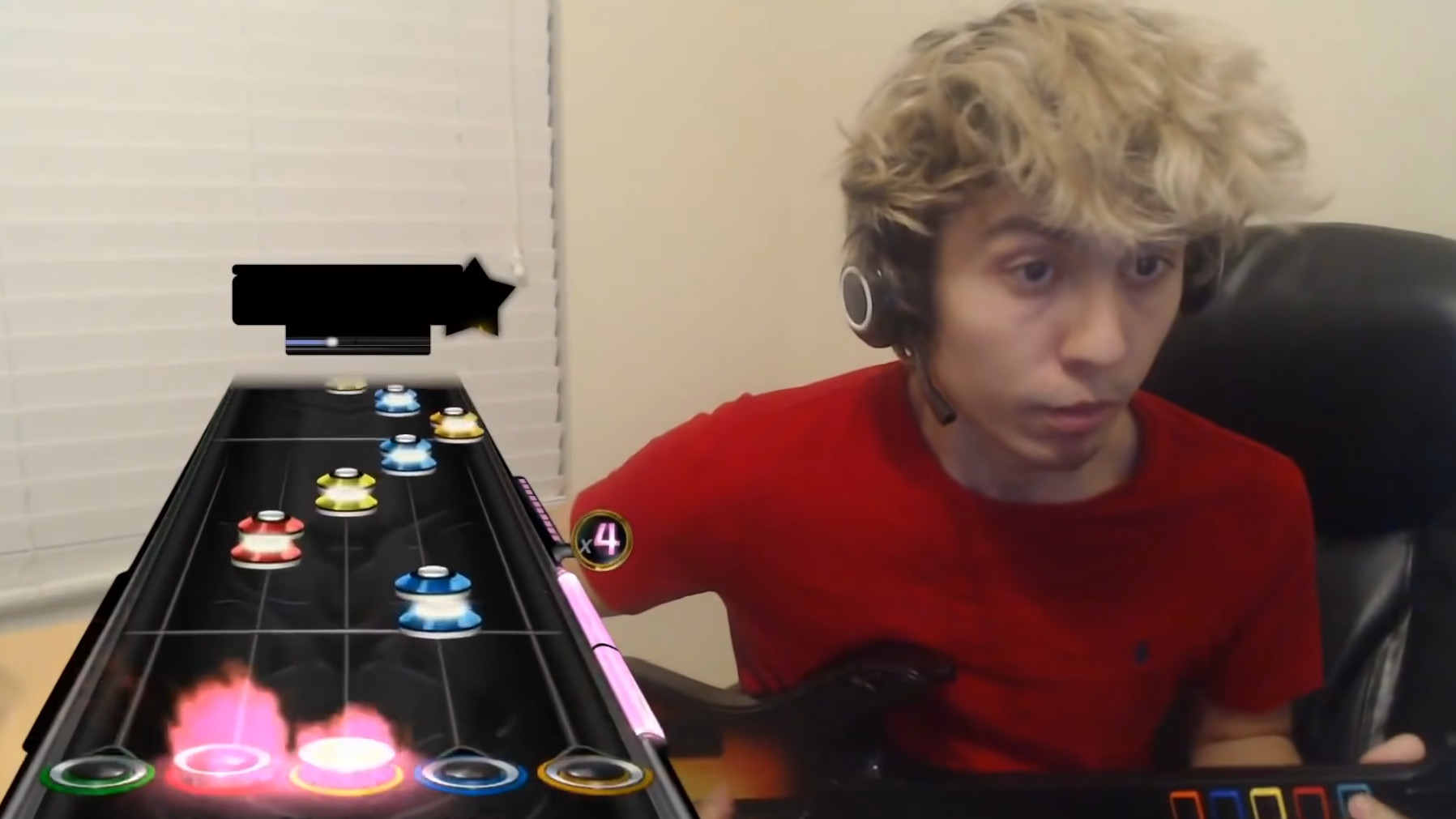Guitar Hero to Guitar Zero: YouTube's best plastic guitarist actually cheated for years
Schmooey has admitted that most of his now-deleted videos were faked.

Guitar Hero player Schmooey, previously thought to be the best in the world, has admitted that he's a fake. Since 2018, the 20-year-old had garnered a legendary reputation in the Guitar Hero community for his mastery of the hardest songs ever made for the game. It wasn't until December 2021, after Schmooey uploaded his most impressive performance yet, that eagle-eyed viewers started to notice something fishy.
Following a January investigation into his legitimacy, Schmooey has deleted every video on his YouTube channel and uploaded a lengthy apology in which he admits the truth: most of his videos were fabricated.
"I'm sorry I'm not the person you thought I was. I am a fraud," Schmooey says in the video. While some of his videos were apparently real, the YouTuber will retire from posting videos and return thousands of dollars he earned playing Guitar Hero.
The story is chronicled in the excellent video below by Karl Jobst, a YouTuber who covered a similar scandal in the Minecraft speedrunning community.
How did Schmooey fake his success? According to a Twitlonger posted by Schmooey, the trick was pretty simple. Schmooey used Cheat Engine to slow down songs in Clone Hero (a faithful PC port of Guitar Hero widely adopted by the community) and play them at an easier difficulty. He'd then speed the recording back up in editing and splice that video together with his webcam footage.
Jobst explains that, over the years, fans had noticed a few oddities in Schmooey's content, like videos with unexplained dropped frames or finger movements on Schmooey's guitar that didn't quite match the notes on screen. It wasn't until Schmooey's December 2021 "flawless" run of 9 Patterns of Eternal Pain, a world-first perfect performance of an extremely difficult song, that he would accidentally draw suspicion to himself with some particularly egregious video errors. Expert players had once again noticed an inconsistency with his fingers and the notes on screen. Even weirder, the last seconds of the video show a Windows Media Player overlay on-screen, revealing that the video itself isn't a live recording, but a screen recording of a previously rendered video.
Schmooey copped to some of his splicing antics in a recorded Discord call in January, but maintained that he had only tampered with a few of his videos. With more suspicious eyes on his videos than ever, the community picked apart his channel in detail and found more blatant splicing (in one video, the score counter randomly drops by 5,000) and, more importantly, evidence that in nearly all of his videos, Schmooey's game had been running slightly slower than it should be.
Keep up to date with the most important stories and the best deals, as picked by the PC Gamer team.
he did some crazy stuff live, he did some crazy stuff in online sessions. It was enough to let our guard down and trust him with being legit and he took advantage of that.January 13, 2022
The tricks sound so simple that you wonder how it took years for Schmooey to be caught, but to my eye, the effect is fairly convincing. The thing about Guitar Hero is that the actual good players all look like they're just slapping random buttons as fast as humanly possible, so it takes a closer look and a healthy dose of skepticism to see inconsistencies in fret patterns and game speed.
To his credit, Schmooey has since admitted to being a fraud and says he's giving back all the money he earned from bounties (cash prizes community members post for anyone that can perfect specific songs). "Yes, most of the stuff I did was inauthentic," Schmooey said in the apology video.
As the Guitar Hero/Clone Hero community reels from the revelation, one popular YouTuber used the opportunity to take back a score that Schmooey previously faked. Acai, who has over a million subscribers, published a perfect run of "Empty Bed" earlier this week using a note pattern that Schmooey himself created.
Around the time Schmooey was exposed as a cheat, Acai expressed hope that a high profile incident like this means it'll be harder for other cheaters to hide moving forward. "He did some crazy stuff live, he did some crazy stuff in online sessions," he said. "It was enough to let our guard down and trust him with being legit and he took advantage of that."

Morgan has been writing for PC Gamer since 2018, first as a freelancer and currently as a staff writer. He has also appeared on Polygon, Kotaku, Fanbyte, and PCGamesN. Before freelancing, he spent most of high school and all of college writing at small gaming sites that didn't pay him. He's very happy to have a real job now. Morgan is a beat writer following the latest and greatest shooters and the communities that play them. He also writes general news, reviews, features, the occasional guide, and bad jokes in Slack. Twist his arm, and he'll even write about a boring strategy game. Please don't, though.

